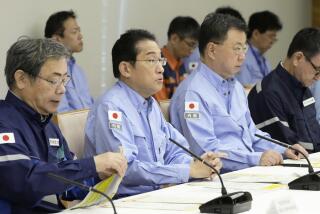Bells Ring in Nagasaki to Mark 50th Anniversary of Atomic Attack
- Share via
NAGASAKI, Japan — Bells at temples and cathedrals rang out today to mark the moment half a century ago when Nagasaki became the second city in history--and so far the last--to suffer an atomic attack.
All over this hilly port city, mourners bowed their heads and bells tolled at precisely 11:02 a.m. to commemorate the dropping of the plutonium bomb, which killed an estimated 70,000 people in the blast and its fiery aftermath.
At Peace Park, near the spot over which the bomb exploded, tens of thousands of survivors, their families and anti-nuclear activists gathered for a quiet memorial service. Incense offered to the dead wafted through the heavy, still summer air, and many clasped their hands in prayer.
The clear voices of children rang out as they recited appeals for peace. A platform in front of Nagasaki’s main bomb memorial--a seated figure with one hand raised to the sky--was heaped high with flowers.
Symbolizing the shift in generations, Nagasaki’s annual Peace Declaration was read by the city’s new mayor, Itcho Itoh, who was born after the bomb was dropped.
Itoh called for an immediate ban on nuclear tests, which China has conducted and France is planning. He also said Japan needs to apologize for its aggression in Asia.
Like that August day 50 years ago, today was a scorching morning in Nagasaki, on the southern island of Kyushu.
Weather played a fateful role in the attack. The primary target was the industrial center of Kokura, on the northern tip of Kyushu, but it was shrouded in clouds.
The skies were clearer over the secondary target, Nagasaki, site of a major shipbuilding facility. So the bomb was dropped here.
As usual, the Nagasaki ceremony was a quieter echo of the one held to commemorate the world’s first and far better known atomic bombing, at Hiroshima. Japan surrendered six days after the Nagasaki attack, nine days after Hiroshima.
More to Read
Sign up for Essential California
The most important California stories and recommendations in your inbox every morning.
You may occasionally receive promotional content from the Los Angeles Times.












